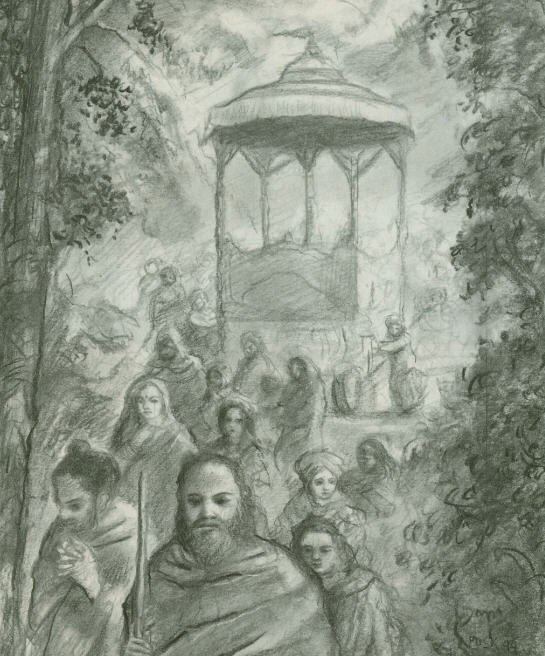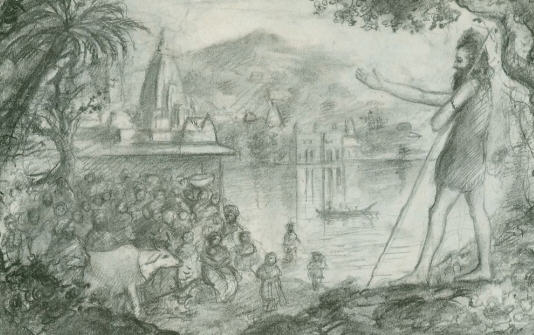King Pandu died in the Himalaya's as the result of a curse, and his devoted wife Madri joined him on the funeral pyre. As the Mahabharata continues, the remains of Pandu's and Madri's bodies are carried back to Hastinapura, the capital of their kingdom, for a state funeral.

The Great Godly Sages performed the avabhrtha bath to conclude the funeral rites for Pandu. Thereafter the sages came together and took counsel.
"King Pandu gave up his kingdom and country and came here to undertake austerities under the shelter of the ascetics. That noble soul, that great ascetic, has now left his young sons and wife under our care and has gone to the spiritual world."
The ascetics of Sata-srnga, kind and self-realized men dedicated to the welfare of all creatures, placed before their own interest the interest of Pandu's sons. Those ascetics therefore decided to leave their peaceful forest retreat and escort the members of Pandu's family back to Hastinapura, the capital, and entrust them to Bhisma and Dhrtarastra. Taking the remains of Pandu's body, and of Madri's, the ascetics departed with Pandu's surviving wife and sons.
Kunti was joyful by nature, and although she faced a long journey, as an affectionate mother she thought about her children, and the long road seemed short. Before much time had passed she found herself once again in Kuru-jangala, the country of the Kurus. The illustrious lady approached the capital and arrived at the city gate known as Vardhamana.
When the people of the city heard that thousands of Caranas and learned sages had arrived, they were filled with wonder. As soon as the sun rose, the men of the city, accompanied by their wives, went out to see the ascetics, eager to receive those distinguished guests according to the generous principles of sacred law. Delegations of women and warriors rode out on crowds of vehicles, along with brahmana men and their wives. Similarly, groups of merchants and workers poured out of the city. In the midst of the mighty tumult, not a single person was jealous or disturbed, for all the citizens were spiritually minded people.
Bhisma, son of Santanu, came in person, as did Somadatta Bahlika, Vidura, and Dhrtarastra, the saintly king who had served with the eye of wisdom in Pandu's absence. Gandhari and Ambalika, Pandu's famous mother, accompanied by the godly Satyavati, came out with the women of the royal palace. And the one hundred sons and heirs of Dhrtarastra, headed by Duryodhana, all well adorned with colorful ornaments, came to greet the sages. The Kauravas bowed their heads to the ground before the host of illustrious sages and seated themselves nearby with their royal priests. In the same manner, the capital residents and country folk touched their heads to the ground, bowing to the sages, and sat near the Kauravas.
The Oldest Ascetic Speaks
Seeing the people sitting in silence, Bhisma respectfully offered the kingdom and country to the great sages. Then the oldest ascetic, with his matted locks and deerskin, stood up. Knowing the feelings of the other sages, the mighty seer said, "He who was heir to the Kauravya throne, the ruler of men named Pandu, renounced pleasure and property and went hither to Hundred Peaks. He lived a life of celibacy, with high spiritual motives, and so this son of his, Yudhishira, was begotten by Dharma himself, the god of justice. Similarly, the wind-god gave to that great soul and king a very powerful son named Bhima, who is most distinguished among powerful men. Lord Indra begot in Kunti this boy Arjuna, whose bold prowess lies in his dedication to the highest truth. It is his glory that he will defeat all the bow-wielding warriors of the world. And Madri begot twin sons by the twin Asvin gods. Her two sons, the very pride of the Kuru dynasty, are the young boys, tigers among men, standing here with bow and arrows.

"Thus while living in the forest, constantly devoted to the religious path, the illustrious Pandu has again raised and exalted the family of his forefathers. Seeing his sons take birth, grow, and flourish, and seeing them learn their Vedic lessons, he felt happiness and love ever swell in his heart. Yet even as he walked the path of the saints and obtained the gift of good sons, Pandu passed away to the blessed land of his fathers seventeen days ago.
"Knowing him to be on the funeral pyre, a sacred offering in the mouth of the holy flame, Madri too entered the fire, rejecting her own mortal life. She is with him now, having followed him to his world. Whatever is to be done for her soul and his, let it be done at once.
"Here are the remains of their bodies, and here are their excellent sons. Let these courageous young men and their mother be received with ceremony, honor, and kindness, and when the rites for the departed are done, may he who knew everything of virtue and justice, he who raised up the Kuru nation, may the illustrious Pandu receive the sacred oblations offered to the departed fathers."
Having spoken thus to the Kurus, the sages, together with the Caranas and Guhyakas, instantly vanished before the very eyes of the Kurus. Seeing the multitude of sages and perfected mystics vanish like a magical Gandharva city in the sky, the people were struck with the greatest of wonder.
King Dhrtarastra said:
Vidura, arrange all the funeral rites for Pandu and see that they are worthy of a king, for he was a lion among kings. And take special care for Madri. On behalf of Pandu and Madri, give presents of animals, garments, jewels, and valuables to anyone in need, and as much as they need. Kunti always honors her superiors, so now, following her example, you must honor Madri. May we not grieve over Pandu, but rather rejoice in his praises, for that glorious leader of men lives in his five heroic sons, who were born like sons of the gods.
Sri Vaisampayana said:
"So be it," said Vidura to his brother, and together with Bhisma he arranged all the sacraments for Pandu in a most discreet area. The royal priests quickly brought from the city blazing sacred fires headed by the Ajyahoma. Pandu's relatives, close friends, and royal ministers stood near in prayerful attendance on the departed one. The remains of Pandu and Madri were placed in an exquisitely adorned vehicle drawn by an honor guard of men. The beautiful scene was enhanced by the royal white umbrella, white yak-tail fans, and the stirring sounds of all kinds of instruments. Men by the hundreds carried heaps of jewels and distributed them on behalf of Pandu to those in need, so that his charity might speed him to a godly destination. Then, for Pandu's sake, they brought (for distribution) large shining white umbrellas and beautiful garments.
White-robed sacrificial priests poured oblations into the sacred fires that moved along in front of the funeral wagon. Teachers, rulers, merchants, and workers by the thousands, sobbing and stricken with grief, followed their fallen king. "He has left us," they cried, "placing us in unending grief. The greatest protector no longer protects us. Where will our king go now?"
Pandu's Relatives Grieve
Crying out in grief, all the Pandavas, with Bhisma and Vidura, set down in a lovely corner of the forest on the bank of the Ganges the remains of Madri and Pandu, the lion of kings, ever truthful and ever victorious.
Pandu's mother cried out, "My son!
O God, my son!" and stunned with grief suddenly collapsed onto the earth. Seeing her fallen in such agony, all the capital residents and the country folk cried out at once with heart-rending sounds, for they loved the king, and the sight of his mother tore at their souls. Joining mankind, all the creatures, even the poor animals, let out their anguished cries, as if their lives were leaving them.
Bhisma, son of Santanu, the broadminded Vidura, and all of the Kauravas wailed from the depths of their grief. Then Bhisma, Vidura, King Dhrtarastra, their relatives, and all the Kuru women made the offering of sacred water for the departed. O king, when the sons of Pandu had made their offering and were pale and drawn from lamentation, all the government officials, themselves lamenting, surrounded the boys. That night, the young sons of Pandu simply lay down and slept there on the bare earth, and all the citizens, headed by the brahmanas, did not return to their homes but they lay there with them on the empty ground. For twelve nights the entire city, down to the little children, remained there with the Pandavas. There was no pleasure, nor did anyone feel sound or healthy, nor was there joy in a single heart.
Sri Vaisampayana said:
Then Vidura, King Dhrtarastra, Bhisma, and the rest of the family offered Pandu the sacred offering of food and nectar meant for the departed and fed the Kuru people and the qualified brahmanas by the thousands, giving to the very best brahmanas excellent villages and heaps of jewels. When the Pandavas, the pride of the Bharata line, had cleansed themselves and put on new garments, the citizens took them along and entered the city of Hastinapura. Constantly grieving for the departed Bharata chief, the residents of the capital and the country folk all felt as if their own friend and kin had died.
Satyavati's Renunciation
When the sraddha ceremony for the departed was complete and Vyasadeva saw the people bewildered with grief and his own mother, Satyavati, agonizing over the loss, Vyasadeva said to her, "The happy times are passed, and dreaded times are coming quickly upon us. Now each new day will bring greater sin, for the earth has lost her innocent youth. Utterly infested with delusion, crowded and choking with hypocrisy, a terrible age is coming, and it will be the ruin of religion, sacrifice, and ideal conduct.
"You must go now. Take up the life of renunciation by linking yourself with God, and live in the forest with the ascetics. I do not want you to see the tragic devastation of your dynasty."
"So be it," she said, in complete agreement with her son. Satyavati then entered the quarters of her daughter-in-law and said, "Ambika, we have heard that the Bharata men, with their relatives and grandsons, will all perish, and it will happen by the wicked counsel of your son, Dhrtarastra. Let us take your sister, who is tortured with grief over the death of her son Pandu, and if you think it is all right, let us go to the forest and seek the blessings of the Supreme Lord."
"So be it," replied Ambika.
Satyavati, ever true to her vows, then received final permission from her stepson Bhisma, and taking her two daughters-in-law with her, she went to the forest. O best of the Bharatas, those godly women lived in the forest and performed the most difficult and frightening austerities. Then, giving up their mortal bodies, they all achieved the highest spiritual perfection.
Hridayananda Dasa Goswami led the team of devotee-scholars who completed the translation and commentary of Srimad-Bhagavatam begun by His Divine Grace A.C. Bhaktivedanta Swami Prabhupada. Fluent in several languages, Hridayananda Dasa Goswami has extensively taught Krsna consciousness in India, Europe, the United States, and Latin America. He is a member of the Governing Body Commission, the ultimate managing authority of the international Society for Krishna Consciousness. He is now doing graduate work in Sanskrit and Indian Studies at Harvard University.
